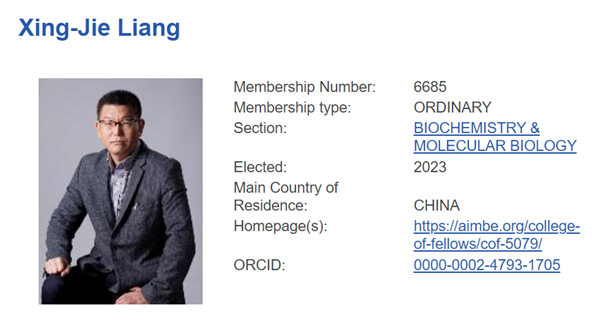Home> News
BSC executive council member elected as member of Academia Europaea
Updated: 2023-07-31
Liang Xingjie, an executive council member of the Biophysical Society of China (BSC) and researcher at the National Center for Nanoscience and Technology, has been elected as a member of the life sciences section of the Academia Europaea in recognition of his outstanding contributions to the academic field.

Liang is a recipient of the national distinguished youth fund in biological materials and nanomedicine, and a PhD supervisor. After obtaining his PhD degree at the National Key Laboratory of Biomacromolecules of the Institute of Biophysics of the Chinese Academy of Sciences (CAS), he conducted five years of postdoctoral research at the Laboratory of Cell Biology, National Cancer Institute of the National Institutes of Health (NIH), under the supervision of Michael M. Gottesman, deputy director of the NIH and a member of the US National Academy of Sciences.
During that period, Liang studied the molecular and cellular resistance mechanisms of malignant tumor cells to cisplatin, a chemotherapy drug.
Liang also worked at the Surgical Neurology Branch of the Porter Neuroscience Research Center at the National Institute of Neurological Disorders and Stroke, researching drug and gene therapy mechanisms for malignant brain gliomas. Before returning to China, he served as an assistant professor at the Department of Radiology, School of Medicine of Howard University, where he focused on molecular and cellular imaging of nanodrugs in animal models.
Currently, Liang works as deputy director of the CAS Key Laboratory for Biomedical Effects of Nanomaterials and Nanosafety, leader of the Nanomedicine Group at the CAS Center for Excellence in Nanoscience, and a senior member of the Chinese Pharmaceutical Association. Liang serves at multiple esteemed journals. He is also the chief editor of Exploration, associate editor of Biophysics Reports and Biomaterials, a member of the editorial advisory board of ACS Nano, editorial board member of Theranostics, Biomaterials Research, and Bioconjugate Chemistry, as well as a guest editorial board member of Biotechnology Advances.
Liang has long been engaged in research on the design, synthesis, structural optimization and functional measurement of nanodrugs, as well as the biological mechanisms of their clinical applications.
Academia Europaea was founded in 1988 by the Royal Society of the United Kingdom and multiple academies of sciences of France, Germany, Italy, the Netherlands, Sweden, and other countries. It is one of the top-tier academic institutions in Europe and serves as the "National Academy of Sciences" and statutory scientific advisor to the European Union, with four divisions of natural sciences, social sciences, humanities and life sciences, spanning 23 fields of study.
Members of Academia Europaea are awarded to internationally renowned scholars who have made outstanding contributions and exerted significant impact in the above-mentioned fields. Nearly 90 Nobel Prize laureates are among the members of the academy.
